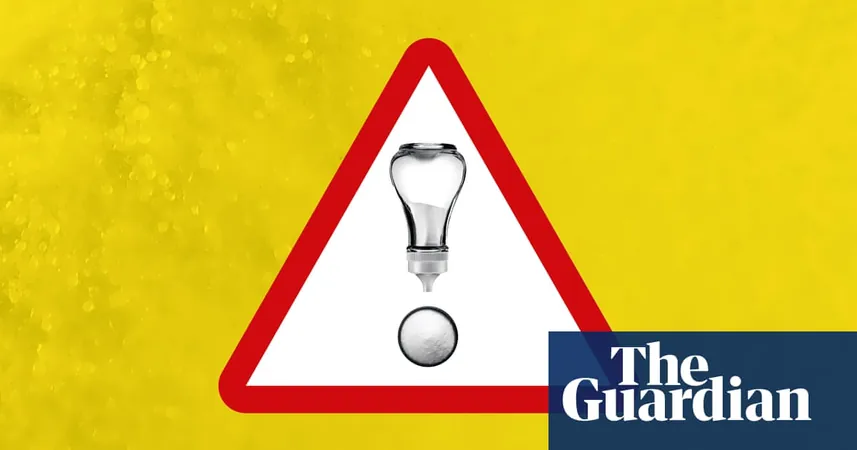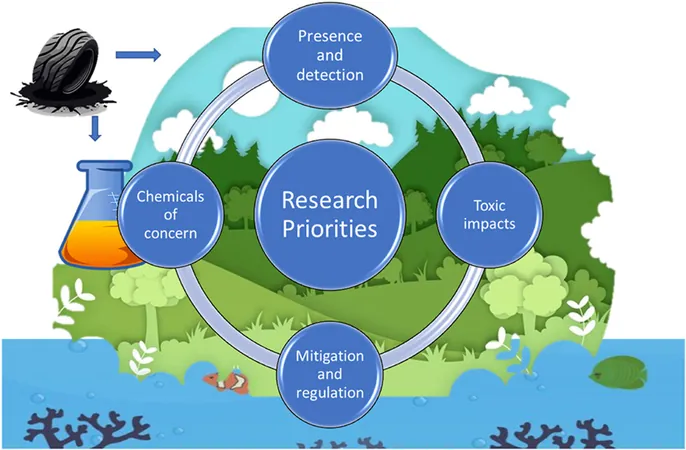
The Salt Crisis: Uncovering the Hidden Danger Lurking in Your Meals
2024-11-24
Author: Liam
Last Tuesday, I grabbed a quick lunch from Wasabi, a well-known chain serving Japanese-inspired dishes. Eager for something satisfying yet healthy, I chose a vegan ramen, delightfully packed with turmeric noodles, vegetable gyozas, and a host of other fresh ingredients swimming in a soy and miso broth. As delicious as it was, I felt a twinge of suspicion. A quick check of the nutritional information revealed something shocking: a staggering 5.07g of salt per serving—nearly exceeding the World Health Organization’s daily limit of 5g.
While enjoying a flavor-packed meal now and then is fine, this ramen highlights the alarming reality of hidden salt in seemingly healthy options. The average Brit consumes about 8.4g of salt daily, a whopping 40% over the UK's allowable maximum of 6g. The consequences? Excessive salt intake contributes to high blood pressure, which is a leading catalyst for heart attack and stroke. Action on Salt states that thousands die unnecessarily each year due to high salt consumption. Imagine if everyone in the UK reduced their intake by just 1g a day; it could prevent 4,000 heart attacks and strokes annually.
The British Heart Foundation offers hopeful statistics: if every adult reduced salt intake to meet the WHO guidelines by 2030, there could be up to 1.4 million fewer cases of high blood pressure by 2035. The WHO emphasizes that lowering sodium intake is among the most cost-effective health strategies available. Shockingly, even individuals on hypertension medications could see significant improvements by slashing their salt intake in half.
Unlike sugar, which displays its effects through visible symptoms like weight gain or mood swings, the dangers of salt consumption are often insidious. Sonia Pombo, from Action on Salt, notes the hidden nature of salt's effects—around 5 million people in the UK may suffer from undiagnosed hypertension. This silent issue brings a plethora of risks, including stomach cancer, kidney disease, and osteoporosis.
The UK established its 6g salt limit in 1991, with a concerted effort to reduce salt intake gaining traction after 2002. Efforts in the 2000s saw salt consumption fall by 15%, contributing to reductions in blood pressure and heart disease deaths. However, progress has stalled since 2011, and salt intake is creeping back up. While countries like Argentina and South Africa have implemented strict salt reduction mandates, the UK seems to lag behind.
Experts hope that the new Labour government, under Prime Minister Keir Starmer, will reinvigorate these efforts. Dr. Swrajit Sarkar emphasizes the importance of prevention in healthcare, which echoes the sentiments shared by Pombo as they advocate for revised salt reduction initiatives.
But what can individuals do to manage their salt intake today? A significant 85% of the salt we consume is hidden in processed foods, making it difficult to adhere to dietary limits. Pombo states bread is the largest contributor of salt in UK diets, followed by bacon, ready meals, and various snacks, which may surprise many people. To combat this, individuals should familiarize themselves with high-salt foods, read labels diligently, and opt for products with lower sodium.
Cooking at home is a powerful strategy; it empowers you to control the ingredients and salt content in your meals. Gradually decreasing salt in your cooking can retrain your palate over the course of a few weeks. Notably, while gourmet salts like Himalayan or Maldon may seem healthier, they contain similar sodium levels as regular table salt.
For those craving salty snacks, healthier alternatives such as unsalted nuts, lower-salt crisps, or fruit could be beneficial. Dining out poses challenges since many restaurant meals are laden with hidden salt. By knowing which items to avoid—like processed meats and overly salted condiments—you can make informed choices.
The impact of excessive salt intake doesn’t affect everyone equally; people from certain ethnic backgrounds, older individuals, and those on lower incomes are more susceptible to its detrimental effects. Meanwhile, the myth that low-salt diets are risky holds no water; our bodies require only a pinch of salt daily, and most of us consume far more than necessary.
Ultimately, managing salt intake is just one facet of maintaining healthy blood pressure. Regular exercise, moderate alcohol consumption, and weight management are equally important. With the NHS under strain, prioritizing our health begins with being mindful of our diets.
As we face this hidden salt crisis, perhaps it’s time to check our plates and rethink how we flavor our food. Take action now to safeguard your health—your heart will thank you!









 Brasil (PT)
Brasil (PT)
 Canada (EN)
Canada (EN)
 Chile (ES)
Chile (ES)
 España (ES)
España (ES)
 France (FR)
France (FR)
 Hong Kong (EN)
Hong Kong (EN)
 Italia (IT)
Italia (IT)
 日本 (JA)
日本 (JA)
 Magyarország (HU)
Magyarország (HU)
 Norge (NO)
Norge (NO)
 Polska (PL)
Polska (PL)
 Schweiz (DE)
Schweiz (DE)
 Singapore (EN)
Singapore (EN)
 Sverige (SV)
Sverige (SV)
 Suomi (FI)
Suomi (FI)
 Türkiye (TR)
Türkiye (TR)